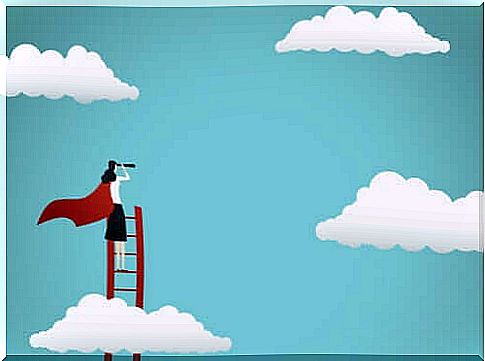Fear Of Insignificance: The Current Epidemic

Fear of insignificance is one of today’s epidemics. Humans are comparators and envious beings. We need a benchmark as to whether we are in a place that will allow us to survive or not. Who are we comparing ourselves to right now? To our family members or to the people who are in our city, or in our neighborhood. And they do exactly the same.
We are now comparing ourselves to unattainable characters, to marketing products ; comparisons in which we are always “losers”. This fear of insignificance is one of the modern epidemics. It is painful because, in reality, most of the images are manipulated.
Faced with this, it is very important that people learn to have their own values and to set their own goals. As we are such a poorly functioning society on the inside, the fear of insignificance has gained ground, there are many people who grow up without a clear understanding of what is important to them.

Fear of insignificance: faced with many influencers , few referents
We live in a technological world, also tending towards an even more technological world. We have at our disposal means that allow us to communicate globally in a personal or anonymous way.
Social networks give us a space to express what we feel and think. They are used by brands to connect with people and by people to connect with brands.
Companies are spending more and more money on increasing their community of active followers on social networks ; they are looking for people to recommend their products and services instead of directly advertising. More and more companies are betting on this formula and, above all, more and more are ready to pay for it.
Most influencers are hidden brands. Projecting manipulated lives has no influence. The danger that a large number of influencers can generate lies in the distorted prototype that they project as a reference. Let us recall at this stage the importance of education, responsibility and personal effort. We are leading our young people down the wrong path. They should not want a light load, but a strong back.
The negative stigma of mediocrity: devalued normality

Normality moves the world. Normality has marked and will continue to mark our evolution as a species. Today, the feeling of devaluation towards normality is more and more present, whereas it is one of the fundamental pillars of the functioning of our societies.
More and more parents are trying to make their children stand out in some field, sport, school, music, etc. ; the problem is that they are willing to pay a very high price to achieve it (in some cases they are not even aware that they are paying the price). This reinforces the current fear of insignificance. Our mission will be to sow in the little ones the idea that they themselves are responsible for the objectives and goals they pursue, with all that that implies.
Educating in frustration, in personal and collective effort, in individual initiative, will give the rising generation a chance not to suffer from this epidemic. Think that in many cases this fear of insignificance translates into anxiety disorders and depression.
Being important in society does not guarantee our well-being or happiness, and may not even help or harm us. New social epidemics distract us from ourselves, from our own goals. They constantly bombard us with external and foreign goals, directly or indirectly creating dissatisfaction and non-existent needs to fuel excessive consumption.









